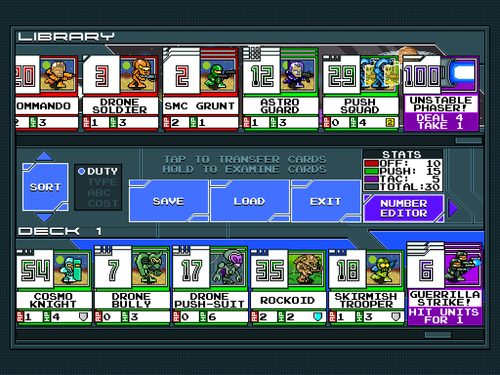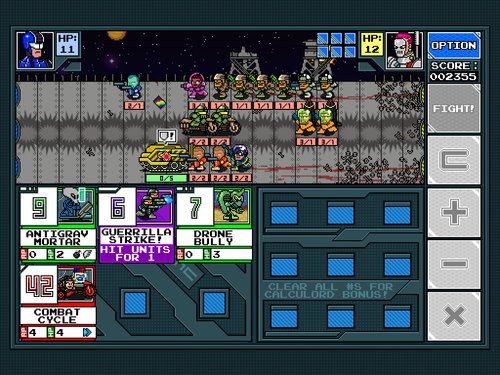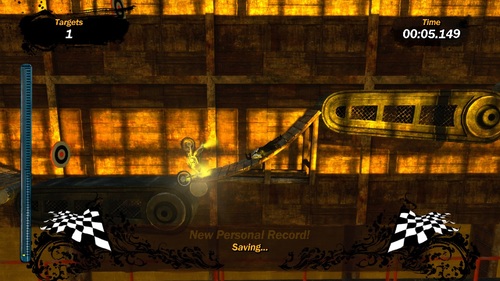Dwarven Den is barely a puzzle game; while the earlier levels might seem clever and lure players in with a slow difficulty curve, the game becomes quite difficult past a certain point which left me wondering about what 'puzzles' are when maps are randomly generated, resources are scarce and of course, sold for real money.
Colosatron is a weird thing. I'm almost tempted to say that it's barely a game because of the limited input you have on it. You don't control the main character - a giant robot dragon rampaging around cities - but you rather work to improve it by adding weapons on it and by sometimes using one of two skills you can unlock after destroying the first capital. I've had some fun with it, altough it was mostly mindless and I never felt challenged at all by any of it.
Paperma is an okay little puzzle game where you fold paper around in order to fill a certain area of the screen with it. You have a limited number of moves to do so and a percentage score that tells you how much of the area you've filled - and how much of the outside area isn't filled. If you get stuck, you can buy hints that reveal the next move you should do. It's one of these calm puzzle games where you can solve a bunch of time while taking your time.
Forge Quest is early access, that means the game is not completed yet. It also means that some of the issues I have with it could be fixed when the final product will be released. I had quite a fun time with this little hack and slash RPG, but it ended in a frustrating dungeon experience, brought by procedural generation of rooms, always an interesting mean to create replayability with the caveat of lacking hand-crafted expériences.
Bicolor is a fun little puzzle game with very little issues. Then again, the gameplay is also pretty straightforward, you have to fill the screen with one color by moving tiles around. They have a number on them, and that’s the number of squares you have to move them before they disapear.
Knights of Puzzelot is a haunted game, haunted by the specter or free to play mechanics and tactics to get your money. The core game is quite good, but that’s even more of a bummer when almost every step of the way, I’m left wondering if something is difficult because they want me to pay, or if it’s just annoying for the sake of convincing me to pay, or wondering if the next level is going to be the one where I have to grind or pay to get past.
Coin Crypt is quite weird, it’s one of these games where your main resource isn’t something you’d usually expect to use as-is. In Coin Crypt, your special moves and your money are one and the same, you fight with coins that you collect in chests and on enemies. I’ve been a bit confused with it, and the lack of help on some systems made me not use them, but I had some fun with it, especially after I’ve figured it out.
Card City Nights is a cute and fun little card game featuring things from other fun games I’ve played (Iji, Hero Core) and I was at first pretty interested by its systems, the way you can win battles and the way the game is structured. However, this didn’t hold out forever
Games where you match blocks are not that rare, but I love those with RPG elements and clever mechanics here and there. 10000000(000?) was a good example of such a game, but Block Legend is less so. I found that a few mechanics were superfluous or not well thought out and the progression was almost doing more harm than good.
Out There is a brutal space adventure game where you are an astronaut in a spaceship and you need to go at the bottom right of the map. To do so, you spend fuel, oxygen, break your spaceship instruments, find alien planets, make decisions, spend fuel, salvage something for precious iron, spend fuel, then drift endlessly in space. I enjoyed it, even if I couldn’t make it very far.
Epoch 2 is very similar to its predecessor, but I liked it nonetheless, the basic infinity-blade-like game where you have a few spots to move and a few actions you can take against wave of enemies suffers from a few weird things here and there but has quite a lot going for it.
OFDP is an interesting little game, although it is very unprofessionally made. Borderline racist voice acting and questionable ‘funny’ texts spread here and there made me groan as I tried to progress through the game, which by itself is pretty much fine, and even a bit novel.
A card game where you play your units and other special moves using maths, Calculords is mighty interesting, but a bit confusing as far as the deck building goes. I really enjoyed my time with it even if it felt like the screen didn’t detect my tapping some of the time, which was quite annoying.
EDF is it’s own thing. It’s an arcade shooter where you mow down waves of bugs, spiders and other robots while collecting silly weapons and slowly becoming stronger as you go through a bunch of maps with little objectives besides killing everything. Lousy technical performances and limited couch co-op, however, are limiting my ability to enjoy the new PS3/Xbox 360 one. How does the PC version of the last one fares?
There rarely are games where you control obviously French Canadian lumberjacks fighting werewolves, especially with tower defence elements thrown in there for good measure. Sang-Froid: Tales of Werewolves has a neat concept and some interesting elements surrounding the core gameplay, but the act of actually playing it feels clunky and not very fun, so I couldn’t get very far into it.
Puzzle Quest Galactrix is a sad puzzle videogame in the line of other great Puzzle Quests. It’s core gameplay is perfectly fine, mind you, but it is ruined by abysmal controls between fights and poorly designed UIs and quests. I enjoyed my time solving puzzles and fighting, but everything between that was painfully boring.
I quite enjoyed PAA:ORSPD episode 3, made by the guys that did Breath of Death and Chtulu saves the world, it was a neat little turn-based RPG with some active time battle elements and some humour. At the end of the day I blasted through it, a bit confused by the plot but quite enamoured by the job system. What about this episode 4? It’s not as good, sadly.
Even with such a name, The “Amazing” Alex isn’t an amazing game. Maybe clever at first, coalescing thoughts about The Amazing Machine of old, but soon a sour disappointment with puzzles based on luck and gratuitous trial-and-error with a broken interface and lack of depth will replace any fondness you might hold for the game.
Yet another port of a console game, Trials works pretty well on the PC. It’s a bit awkward at first to use a random key as the thrust button and then use the arrow keys to tilt the bike, but after a while I got as good with it than I did with the console version.It still has the same issues, but it’s still a blast if you like that almost puzzle-ish arcade feel.
Guacamelee is an interesting metroidvania with a world-switching mechanic and a large swath of memes sprinkled around. I quite enjoyed it, even if it continued (with Vadis Story last week) a trend of PC games almost requiring controllers to play ‘properly’. After progressing through almost all the game, I was stopped by one fight that frustrated me to no end.










































